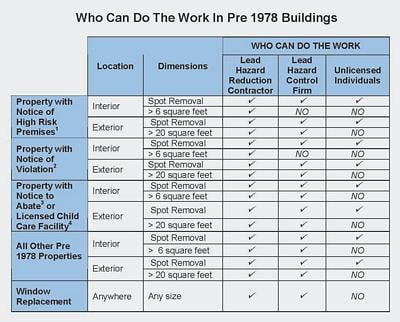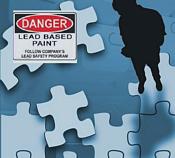Rhode Island RRP Rule
 Rhode Island has been operating a Lead-Safe Remodeler/Renovator Program since 2001 and has licensed over 1,500 Lead-Safe Remodeler/Renovators. In 2010, the Environmental Protection Agency (EPA) created its own Lead-Safe Remodeler/Renovator Program, known as the Lead-Based Paint Renovation, Repair, and Painting Rule. Rhode Island was the first New England state granted authority by EPA to continue its state Remodeler/Renovator program.
Rhode Island has been operating a Lead-Safe Remodeler/Renovator Program since 2001 and has licensed over 1,500 Lead-Safe Remodeler/Renovators. In 2010, the Environmental Protection Agency (EPA) created its own Lead-Safe Remodeler/Renovator Program, known as the Lead-Based Paint Renovation, Repair, and Painting Rule. Rhode Island was the first New England state granted authority by EPA to continue its state Remodeler/Renovator program.
The following information is from the RI Department of Health web site:
Regulated People and Activities
 Rhode Island's RRP Rule applies to contractors, landlords, property managers, homeowners, and anyone else who disturbs painted surfaces on pre-1978 homes or child care facilities. This includes general contractors as well as special trade contractors, such as painters, plumbers, carpenters, and electricians.
Rhode Island's RRP Rule applies to contractors, landlords, property managers, homeowners, and anyone else who disturbs painted surfaces on pre-1978 homes or child care facilities. This includes general contractors as well as special trade contractors, such as painters, plumbers, carpenters, and electricians.
In general, the RI RRP Rule applies to any renovation, repair, or painting that disturbs six square feet or more of paint per room on the interior or 20 square feet or more of paint on the exterior of a pre-1978 house or child care facility. Examples of regulated activities include window replacement, remodeling, repair/maintenance, electrical work, plumbing, painting, carpentry, and any type of demolition.
Not all projects are regulated by the RRP Rule. The chart below details who can do what type of work:

Rhode Island's regulations differ from the federal RRP Rule in a few key ways
• Parents with children younger than six years of age must use a licensed Lead Hazard Control Firm.
• The Lead Hazard Control Firm must submit a Start Work Notification to the Department of Health at least three business days before beginning work.
• A licensed Lead-Safe Remodeler/Renovator must be on site at all times.
• When the work is complete, a clearance inspection by a Rhode Island Certified Environmental Lead Inspector or Technician is required. The clearance inspection must include dust wipe samples analyzed by an approved laboratory. Once acceptable dust levels are achieved, the inspector or technician will issue a Certification of Acceptable Clearance Status.
Exemptions
• Housing built after 1978 and any housing declared lead-free by a Rhode Island Certified Environmental Lead Inspector is generally exempt from Rhode Island's RRP Rule.
• Other exemptions include housing for elderly or disabled persons, studio apartments, and dormitories. These buildings are regulated if a child younger than six years old resides there, or is expected to reside there, for more than two weeks per year.
Requirements
Training
• Contractors, painters, and other workers must complete an eight-hour Lead-Safe Remodeler/Renovator training by a licensed training provider.
Licensing
• Once training is complete, an individual can apply to be a licensed Lead-Safe Remodeler/Renovator.
• All Rhode Island licensed Lead-Safe Remodeler/Renovators must be affiliated with licensed Lead Hazard Control Firms.
• Individuals and firms must renew their licenses every five years after completing a four-hour refresher course. (Note: The fee for firms in RI is only $45.00!)
Start Work & Pre-Renovation Notification
• The firm must deliver a copy of the Rhode Island version of the Renovate Right pamphlet to property owners and tenants no more than 60 days and no less than seven days before work begins.
• The firm must fill out the Pre-Renovation Education form at the back of the pamphlet, have it signed, and keep it for a minimum of three years.
• At least three business days before beginning a job, the firm must submit a Start Work Notification to the Department of Health.
Lead-Safe Work Practices
While work is being performed, Lead-Safe Remodeler/Renovators and their workers must:
• Contain the work area to prevent dust and debris from escaping.
• Refrain from using work methods that generate large amounts of lead-contaminated dust.
• Dry sweeping, using heat guns at temperatures above 1100°F, open flame burning, and using flammable or methylene chloride paint strippers are prohibited.
 When work is complete, Lead-Safe Remodeler/Renovators and their workers must:
When work is complete, Lead-Safe Remodeler/Renovators and their workers must:
• Clean dust and debris using a HEPA vacuum and wet mops.
• Have a Certified Environmental Lead Inspector or Technician conduct a clearance inspection.
• Remove containment barriers upon notification that the dust wipes passed clearance.

 Looking for accurate information about the EPA RRP rule?
Looking for accurate information about the EPA RRP rule? 


